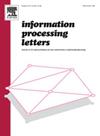Metric distortion of obnoxious distributed voting
IF 0.6
4区 计算机科学
Q4 COMPUTER SCIENCE, INFORMATION SYSTEMS
引用次数: 0
Abstract
We consider a distributed voting problem with a set of agents that are partitioned into disjoint groups and a set of obnoxious alternatives. Agents and alternatives are represented by points in a metric space. The goal is to compute the alternative that maximizes the total distance from all agents using a two-step mechanism which, given some information about the distances between agents and alternatives, first chooses a representative alternative for each group of agents, and then declares one of them as the overall winner. Due to the restricted nature of the mechanism and the potentially limited information it has to make its decision, it might not be always possible to choose the optimal alternative. We show tight bounds on the distortion of different mechanisms depending on the amount of the information they have access to; in particular, we study full-information and ordinal mechanisms.
令人讨厌的分布式投票的度量扭曲
我们考虑一个分布式投票问题,其中一组代理被划分为不相关的组和一组令人讨厌的替代方案。代理和备选方案由度量空间中的点表示。目标是使用两步机制计算与所有代理的总距离最大的替代方案,该机制在给定代理和备选方案之间的距离的一些信息的情况下,首先为每组代理选择一个有代表性的替代方案,然后宣布其中一个作为总赢家。由于机制的有限性和它所拥有的决策信息的潜在有限性,它可能并不总是能够选择最优的替代方案。我们展示了不同机制的扭曲程度的严格界限,这取决于它们所能获得的信息量;特别地,我们研究了全信息和有序机制。
本文章由计算机程序翻译,如有差异,请以英文原文为准。
求助全文
约1分钟内获得全文
求助全文
来源期刊

Information Processing Letters
工程技术-计算机:信息系统
CiteScore
1.80
自引率
0.00%
发文量
70
审稿时长
7.3 months
期刊介绍:
Information Processing Letters invites submission of original research articles that focus on fundamental aspects of information processing and computing. This naturally includes work in the broadly understood field of theoretical computer science; although papers in all areas of scientific inquiry will be given consideration, provided that they describe research contributions credibly motivated by applications to computing and involve rigorous methodology. High quality experimental papers that address topics of sufficiently broad interest may also be considered.
Since its inception in 1971, Information Processing Letters has served as a forum for timely dissemination of short, concise and focused research contributions. Continuing with this tradition, and to expedite the reviewing process, manuscripts are generally limited in length to nine pages when they appear in print.
 求助内容:
求助内容: 应助结果提醒方式:
应助结果提醒方式:


